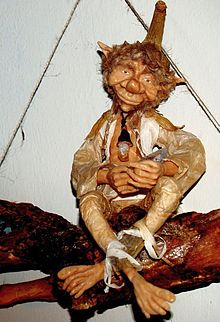duende
Jump to navigation
Jump to search
English
[edit]Etymology
[edit]Borrowed from Spanish duende and (especially in reference to Portuguese or Brazilian folklore) Portuguese duende. Doublet of duwende.
Noun
[edit]duende (countable and uncountable, plural duendes)
- A small, mischievous humanoid creature in Iberian (Spanish/Portuguese), Latin American, and Philippine folklore/mythology; an imp.
- For quotations using this term, see Citations:duende.
- (art) Heightened inspiration or passion, especially in flamenco.
- Personal charm. (Can we add an example for this sense?)
Anagrams
[edit]Norwegian Bokmål
[edit]Pronunciation
[edit]Verb
[edit]duende
- present participle of due
Anagrams
[edit]Portuguese
[edit]Etymology
[edit]Borrowed from Spanish duende, from Old Spanish duen de casa (“house master”).
Pronunciation
[edit]
- Hyphenation: du‧en‧de
Noun
[edit]duende m (plural duendes)
- (Iberian folklore) a small humanoid creature who invades homes at night to carry out mischief and scare the residents
- (by extension, fiction) any small fictional humanoid, especially a mischievous or evil one
Usage notes
[edit]- This term is commonly used in fiction to translate the name of various creatures such as imps, gnomes and goblins.
See also
[edit]Spanish
[edit]
Etymology
[edit]Inherited from Old Spanish duen de casa (“master of the house”). Compare Sicilian donni di casa. See more at dueño.
Pronunciation
[edit]Noun
[edit]duende m (plural duendes)
- (Iberian folklore) a small humanoid creature who invades homes at night to carry out mischief and scare the residents
- (Can we date this quote?), Raquel Cachafeiro Gil, El Duende de la Navidad, →ISBN, page 4:
- El duende de la Navidad vive en las ramas del manzano, pasa el tiempo subiendo y bajando, atareado con unir la luz del sol a la tierra y otras tareas similares. Cada año, en el invierno, se asoma a las ramas y mira a las estrellas y ve caer la […]
- (please add an English translation of this quotation)
- (by extension, fiction) goblin, leprechaun, pixie, elf, imp, brownie, gremlin, hobgoblin
- (by extension) charisma (the power to attract through personal magnetism and charm)
- Synonym: carisma
- (by extension) charm, magic
Derived terms
[edit]Descendants
[edit]- → Cebuano: dewende
- → Chamorro: duendes
- → English: duende
- → Portuguese: duende
- → Russian: дуэ́нде (duénde)
- → Tagalog: duwende, dwende — nonstandard, duende, duwinde, ruwinri — dialectal, Rizal, rare
- → English: duwende
- → Ukrainian: дуе́нде (duénde)
See also
[edit]Further reading
[edit]- “duende”, in Diccionario de la lengua española, Vigésima tercera edición, Real Academia Española, 2014
Categories:
- English terms borrowed from Spanish
- English terms derived from Spanish
- English terms borrowed from Portuguese
- English terms derived from Portuguese
- English doublets
- English lemmas
- English nouns
- English uncountable nouns
- English countable nouns
- en:Art
- English terms with quotations
- Norwegian Bokmål terms with IPA pronunciation
- Norwegian Bokmål terms with audio pronunciation
- Rhymes:Norwegian Bokmål/əndə
- Rhymes:Norwegian Bokmål/ənə
- Norwegian Bokmål terms with homophones
- Norwegian Bokmål non-lemma forms
- Norwegian Bokmål verb forms
- Norwegian Bokmål present participles
- Portuguese terms borrowed from Spanish
- Portuguese terms derived from Spanish
- Portuguese terms derived from Old Spanish
- Portuguese 3-syllable words
- Portuguese 2-syllable words
- Portuguese terms with IPA pronunciation
- Portuguese lemmas
- Portuguese nouns
- Portuguese countable nouns
- Portuguese masculine nouns
- pt:Folklore
- pt:Fiction
- pt:Mythological creatures
- Spanish terms inherited from Old Spanish
- Spanish terms derived from Old Spanish
- Spanish 2-syllable words
- Spanish terms with IPA pronunciation
- Rhymes:Spanish/ende
- Rhymes:Spanish/ende/2 syllables
- Spanish lemmas
- Spanish nouns
- Spanish countable nouns
- Spanish masculine nouns
- es:Folklore
- Spanish terms with quotations
- es:Fiction
- es:Mythological creatures
